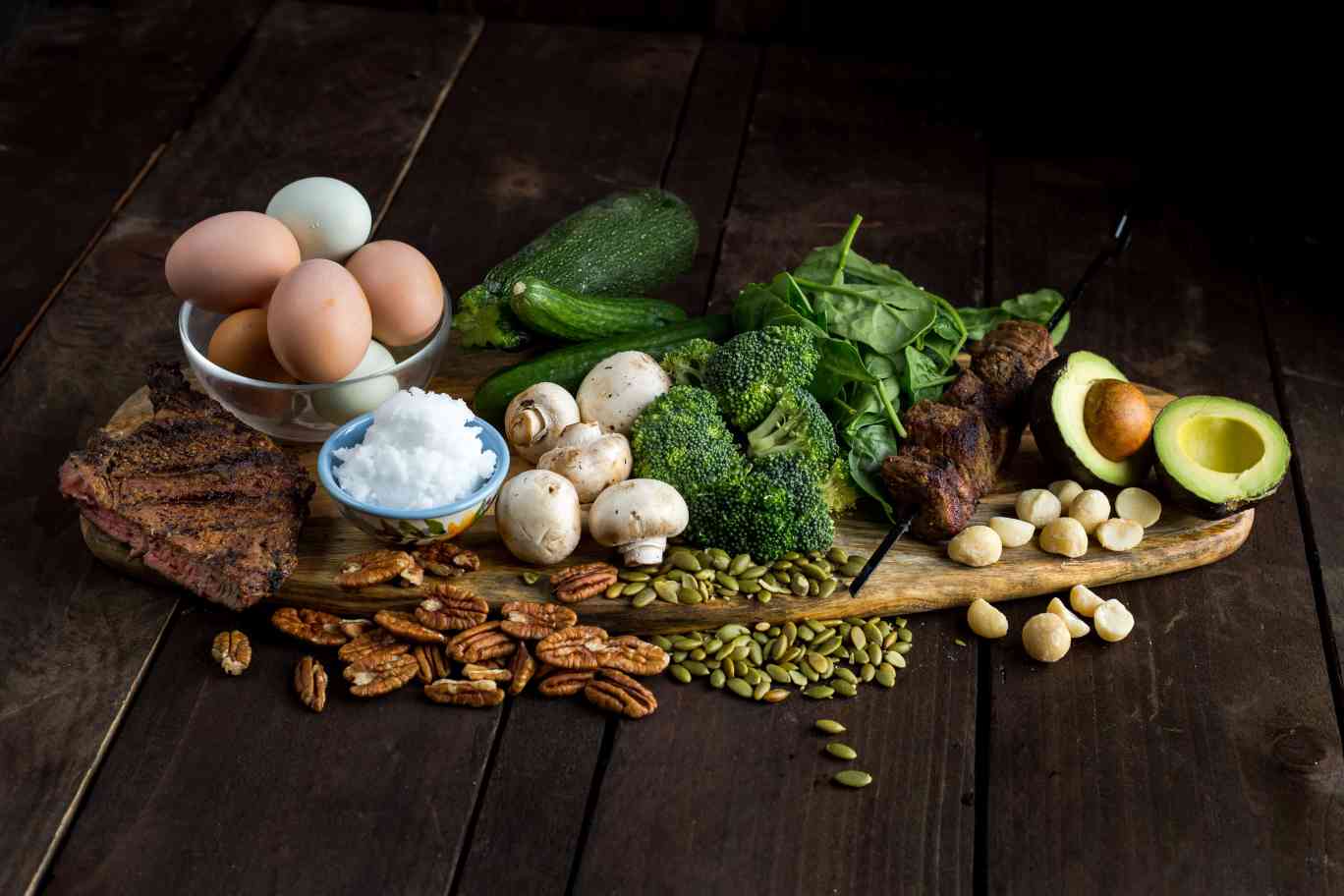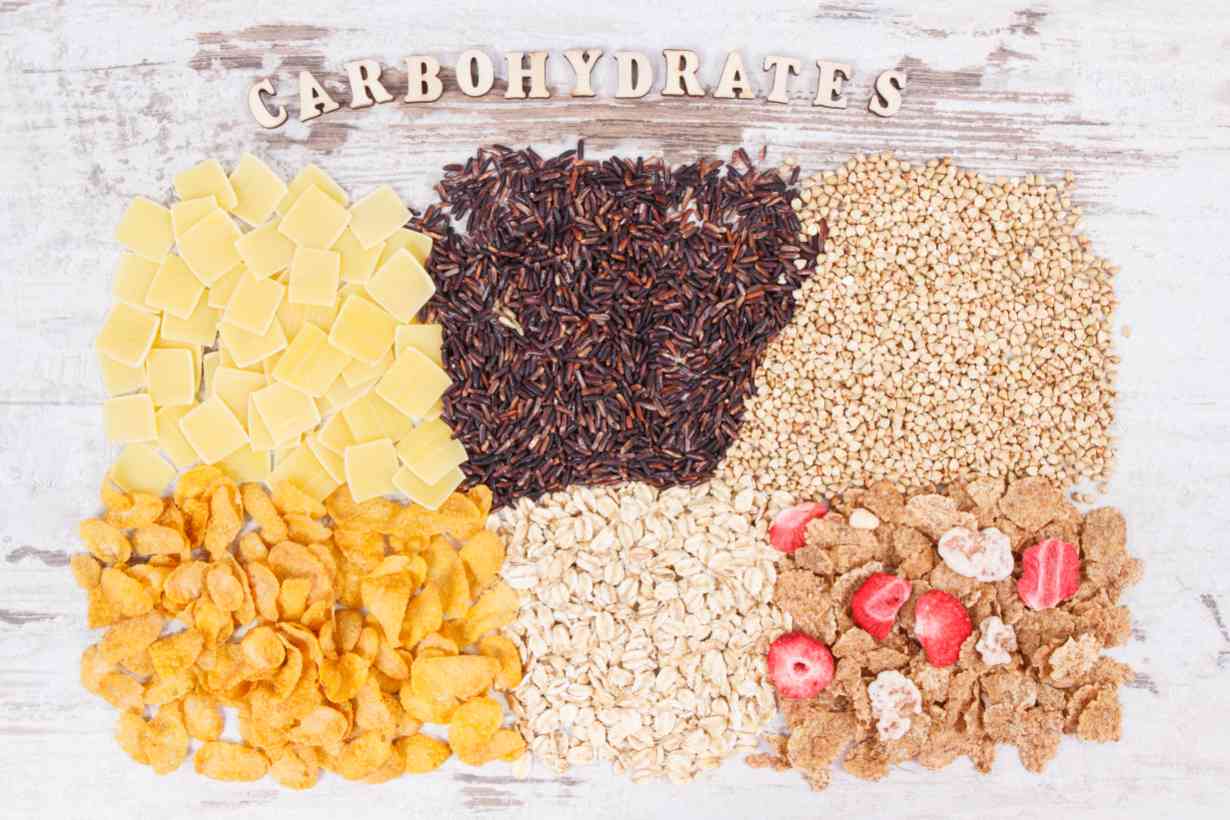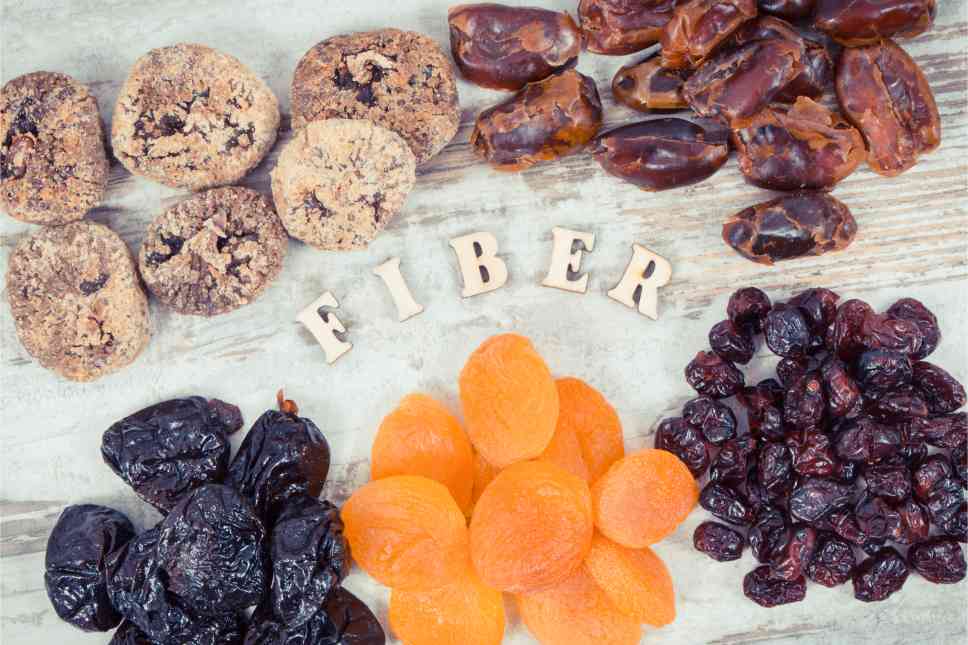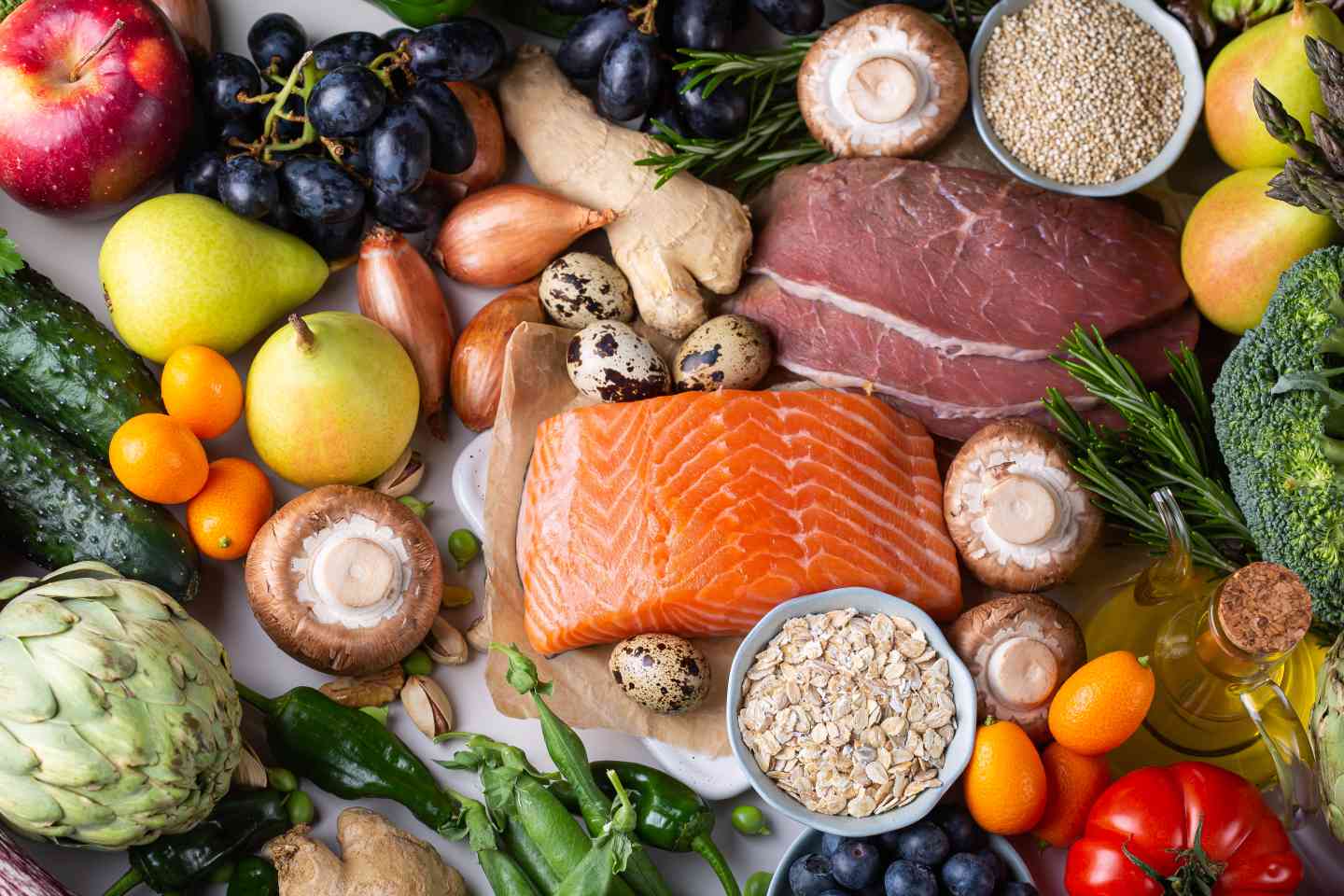7 Essential Types of Nutrients Required For Your Body

A balanced diet must contain the right proportion of fruits, vegetables, nuts, seeds and meat for complete well-being. These food items are the best source of the seven vital nutrients that support physical and mental health.
Typically, nutrients include fats, carbohydrates, proteins, vitamins, dietary fibres, minerals, and water. These elements offer nourishment to the body and protect it from serious diseases. Hence, it is imperative to know the essential types of nutrition and their function for a healthy lifestyle.
Let’s begin the process by first understanding nutrition and its types.

Table of Contents

What is Nutrition?
Nutrition is the physiological process of acquiring energy from food sources for growth and metabolic activities. The body starts absorbing these nutrients as digestion begins.
Typically, there are two major categories of nutrients, namely, micronutrients and macronutrients.
Micronutrients, such as calcium, iron, vitamins, etc., fall under this category. These nutrients extend components required for the body's metabolic activity. They also repair and build damaged tissues to support the organs.
Macronutrients are a crucial energy source in the body. They are produced by breaking down food items. Compounds like proteins, fats, and carbohydrates are considered macronutrients.
The body is technically incapable of producing most nutrients. For instance, it can not produce fat-soluble compounds like vitamin E, an antioxidant. Therefore, an individual must consume vegetables and fruits rich in vitamin E to fulfil the requirement.
To understand the concept better, one needs to list the number of types of nutrition available first. The types of nutrition are segregated into two categories: autotrophic and heterotrophic.
Difference Between Autotrophic and Heterotrophic Nutrition
Now, let’s focus on different types of nutrition and their source to simplify the concept further.
Category |
Autotrophic Nutrition | Heterotrophic Nutrition |
| Definition | Mode of nutrition in which organisms produce their own food using simple inorganic substances. | Mode of nutrition in which organisms obtain food from other organisms. |
| Examples of Organisms | Plants, algae, bacteria | Humans, animals, fungi |
| Source of Energy | Sunlight (photoautotrophs) or chemical reactions (chemoautotrophs) | Organic compounds from other organisms |
| Primary Components Used | Carbon dioxide, water, and sunlight (for photoautotrophs) | Carbohydrates, proteins, and fats from food sources |
| By-products | Oxygen (in photosynthesis) | Carbon dioxide, water, and other waste products |
| Dependency on Other Organisms | Generally independent for food production | Dependent on other organisms for nutrition |
| Chlorophyll Presence | Present in photoautotrophs | Absent |
| Types | Photoautotrophs: Use sunlight for energy. Chemoautotrophs: Use chemical reactions for energy |
Holozoic: Ingest solid food particles. Saprophytic: Absorb nutrients from decaying organic matter. Symbiotic: Obtain nutrients from living hosts. |
Types of Nutrition That Humans Need
Here is a list of the seven vital nutrients essential for human well-being. It is imperative to know that some types of nutrition in humans are independently produced by breaking down food.
1. Carbohydrate

Carbohydrates are also known as carbs or saccharides. They are distinguished based on the number of monomers like disaccharides, monosaccharides or polysaccharides. Food items like rice, noodles, bread, grain-based products, etc., are rich in carbs.
This is because the human body breaks down carbohydrates into glucose, which supports brain and body function. Complex carbohydrates also prevent the loss of muscle mass by preventing the body from breaking down the protein into energy. Therefore, consuming complex carbohydrates can keep an individual full for a long time and manage body weight.
2. Protein

They are a group of molecules that form amino acids. Proteins help in muscle formation and create enzymes and hormones. Nearly 20 amino acids are in the body’s protein, where nearly 10 are absorbed from the diet.
The human body needs amino acids to produce new and repair damaged proteins. Including various foods, like eggs, red meat, dairy, beans, and nuts, would fulfil the protein requirements.
3. Fats

Fats are essential to support cell growth and supply energy to the body. The body uses fat to absorb vitamins. They supply energy to the body and protect organs from damage. Fats are known to keep the body warm and energetic.
Typically, food contains saturated and unsaturated fats. Consuming foods with low saturated fat, like butter, seafood, cheese, coconut oil, chocolate, etc., is always healthier. Foods like salmon, nuts, and avocados are natural sources of unsaturated fats.
4. Water

Every human needs 2 litres of water per day. It helps form digestive juices, the basis of blood, urine and sweat. In addition, water is required to regulate body temperature, reduce the risk of cystitis, maintain cell health, lubricate cushion joints, and keep the bladder clean from bacteria.
5. Minerals

Minerals are essential micro-nutrients that help build strong bones and maintain a healthy heart rate. Sodium, Chloride, Magnesium, Sulphur, Phosphorus and Calcium are vital minerals for the human body.
6. Fibres

Dietary fibres are a form of carbohydrates or polysaccharides that help in digestion. However, the body doesn’t gain any nutrients or calories from the fibres. However, it helps in removing the toxic waste from the digestive system.
Moreover, it regulates bowel movement and removes the risk of cancer from the body. Wholemeal bread, wheat, bran, nuts, vegetables, etc., are rich sources of fibre.
7. Vitamins

Vitamins are essential nutrients that the body needs in small amounts. Typically, the body can't produce vitamins. Thus, it needs to be consumed in a diet.
They are grouped as water-soluble and fat-soluble. Vitamins D, A, E and K are fat-soluble vitamins that easily travel through the kidneys and are excreted.
On the other hand, folate, riboflavin, vitamin C, vitamin B12, vitamin B6, niacin and thiamin are water-soluble vitamins stored in the body cells.
What are Some of the Healthy Sources of Nutrients?

Simply understanding the types of nutrition won’t help an individual maintain a healthy lifestyle. Instead, they need to take the initiative to plan a meal that combines the benefits of the discussed nutrients.
Nutrients |
Sources |
| Carbohydrates | Whole grains (brown rice, oats), fruits (apples, bananas), vegetables (sweet potatoes, corn), legumes (beans, lentils) |
| Proteins | Lean meats (chicken, turkey), fish (salmon, tuna), eggs, dairy products (milk, yoghurt), legumes (beans, lentils), nuts, seeds |
| Fats | Avocados, nuts (almonds, walnuts), seeds (chia, flax), olive oil, fatty fish (salmon, mackerel), coconut oil |
| Vitamin A | Carrots, sweet potatoes, spinach, kale, apricots, liver, fortified dairy products |
| Vitamin C | Citrus fruits (oranges, lemons), strawberries, bell peppers, broccoli, Brussels sprouts |
| Vitamin D | Sunlight exposure, fortified milk, fatty fish (salmon, mackerel), egg yolks, fortified cereals |
| Vitamin E | Nuts (almonds, hazelnuts), seeds (sunflower seeds), green leafy vegetables (spinach, broccoli), vegetable oils (sunflower, safflower) |
| Vitamin K | Leafy green vegetables (kale, spinach), broccoli, Brussels sprouts, cabbage, green beans |
| B Vitamins | Whole grains (brown rice, oats), meat (beef, pork), eggs, dairy products (milk, cheese), legumes (beans, lentils), leafy green vegetables (spinach, kale) |
| Calcium | Dairy products (milk, cheese, yoghurt), leafy green vegetables (kale, broccoli), fortified plant-based milk (soy, almond), tofu, sardines |
| Iron | Red meat (beef, lamb), poultry (chicken, turkey), fish (salmon, tuna), beans, lentils, fortified cereals, spinach |
| Magnesium | Nuts (almonds, cashews), seeds (pumpkin, chia), whole grains (brown rice, quinoa), leafy green vegetables (spinach, Swiss chard), legumes (black beans, chickpeas) |
| Potassium | Bananas, oranges, potatoes, sweet potatoes, spinach, tomatoes, avocados, beans, lentils |
| Sodium | Salt (in moderation), seafood, beets, celery, milk, spinach |
| Water | Drinking water, herbal teas, fruits (watermelon, oranges), vegetables (cucumbers, lettuce) |
| Fibres | Whole grains (brown rice, oats), fruits (apples, berries), vegetables (broccoli, carrots), legumes (beans, lentils), nuts, seeds |
Useful Tools to Track Your Health
Exact Proportion of Nutrients Needed for the Body
The exact proportion of nutrients that the human body requires can differ from person to person depending on age, gender, level of physical activity and some medical conditions. Here is a table containing suggested ratios for macronutrients and daily values for certain key micronutrients based on typical adult-consumed food:
Macronutrients Proportion
SNo. |
Macronutrient | Proportion of Total Daily Calories |
| 1 | Carbohydrates | 45-65% or 325000 milligrams per day |
| 2 | Proteins | 10-35% or 800 milligrams per day |
| 3 | Fats | 20-35% (with less than 10% from saturated fats) or 77000 milligrams per day |
Micronutrients Daily Values
SNo. |
Micronutrient | Recommended Daily Value (DV) |
| 4 | Vitamins | |
| Vitamin A | 900 mcg (men), 700 mcg (women) | |
| Vitamin C | 90 mg (men), 75 mg (women) | |
| Vitamin D | 20 mcg (800 IU) | |
| Vitamin E | 15 mg | |
| Vitamin K | 120 mcg (men), 90 mcg (women) | |
| 5 | B Vitamins | |
| - B1 (Thiamine) | 1.2 mg (men), 1.1 mg (women) | |
| - B2 (Riboflavin) | 1.3 mg (men), 1.1 mg (women) | |
| - B3 (Niacin) | 16 mg (men), 14 mg (women) | |
| - B6 (Pyridoxine) | 1.3-1.7 mg (men), 1.3-1.5 mg (women) | |
| - B9 (Folate) | 400 mcg | |
| - B12 (Cobalamin) | 2.4 mcg | |
| 6 | Minerals | |
| - Calcium | 1,000 mg (adults), 1,200 mg (women 51+ and men 71+) | |
| - Iron | 8 mg (men), 18 mg (women) | |
| - Magnesium | 400-420 mg (men), 310-320 mg (women) | |
| - Potassium | 4,700 mg | |
| - Sodium | Less than 2,300 mg | |
| 7 | Fibre | 25 g (women), 38 g (men) |
| 8 | Water | About 1.5 to 2 litres per day |
Deficiencies Caused By Nutritional Deficiency
Malnutrition and vitamin deficiency cause many diseases, affecting various organs and overall well-being. This is an outline of potential deficiencies due to essential nutrients.
Macronutrients Deficiency
- Carbohydrates: Poor mental function, fatigue, low energy levels and muscle weakness. Prolonged deprivation can result in ketosis, which occurs when fat is used for energy, causing bad breath and headaches, amongst other symptoms.
- Proteins: Muscle wasting, weakened immune system, the slow wound healing process, hair loss and oedema. Severe protein deficiency may also lead to kwashiorkor which comes with potbelly, skin changes and retarded growth in children.
- Fats: Increased susceptibility to infections, dry, scaly skin, and poor wound healing. It is worth noting that the absence of essential fatty acids affects brain development and functions, especially for infants and young children.
Micronutrient Deficiency
- Vitamins
- Vitamin A: Night blindness, dry eyes, susceptibility to infections, skin problems. Severe cases show up as xerophthalmia, leading to blindness.
- Vitamin C: Scurvy characterised by tiredness, gum disease, easily bruised, poor wound healing, etc. Severe cases may cause anaemia or result in infectious diseases like colds.
- Vitamin D: Rickets in children (soft, weak bones), osteomalacia in adults (bone pain and muscle weakness), and increased risk of osteoporosis.
- Vitamin E: Nerve and muscle damage, vision problems, weakened immune function, and hemolytic anaemia in infants.
- Vitamin K: Increased bleeding and bruising, prolonged clotting time, and in severe cases, bleeding in the brain (especially in newborns).
- B Vitamins
- B1 (Thiamine): Weakness characterised by beriberi, nerve damage, and cardiovascular issues. Wernicke-Korsakoff syndrome may develop among alcoholics who are most affected.
- B2 (Riboflavin): Ariboflavinosis causes painful throat redness, swelling on the mouth and sides due to cracks and a swollen magenta tongue.
- B3 (Niacin): Pellagra results in dermatitis, diarrhoea, dementia or, if untreated, death.
- B6 (Pyridoxine): Anaemia with dermatitis, depression, confusion, weakening immune system functioning.
- B9 (Folate): Megaloblastic anaemia develops during pregnancy, leading to neural tube defects among newborns as well as increased homocysteine levels that pose a cardiovascular risk factor.
- B12 (Cobalamin): Pernicious anaemia is associated with neurologic symptoms, including numbness, tingling, balance problems, fatigue, and cognitive disturbances.
- Minerals
- Calcium: Osteoporosis, osteopenia, muscle cramps, spasms and the hand tingling sensation. Among children, it may lead to rickets.
- Iron: Iron-deficiency anaemia defined by tiredness, weakness, pale skin, shortness of breath and delayed growth in children.
- Magnesium: Muscle cramps disorder of mind bones that are porous fatigue variation in a heartbeat.
- Potassium: Hypokalemia(fatigue) makes a person weak, feel tired, suffer muscle cramps, digestive problems, and be affected by palpitations.
- Sodium: Hyponatremia (headache), nausea and vomiting or feeling tired, muscle cramps disorientation, convulsions, coma, seizures and death.
- Water: Lack of water can lead to dry mouth, lack of energy, impaired judgement, and decreased urine production. Ultimately, severe dehydration can cause kidney damage, heat stroke, or death.
- Fibre: Inadequate quantities of fibre result in constipation, digestive problems, a higher probability of colon cancer ailment, elevated cholesterol levels, weight gain and blood sugar that fluctuates.
In conclusion, it is important to incorporate all types of nutrients into your meals to keep your body healthy and energetic. Ensuring a balance of carbohydrates, proteins, fats, vitamins and minerals, water, and fibre in your diet enhances your well-being. Giving priority to a varied, nourishing meal plan will support you with energy while avoiding a lack of vital elements that could threaten your health.
Protect What Matters - Explore Other Insurance Options














